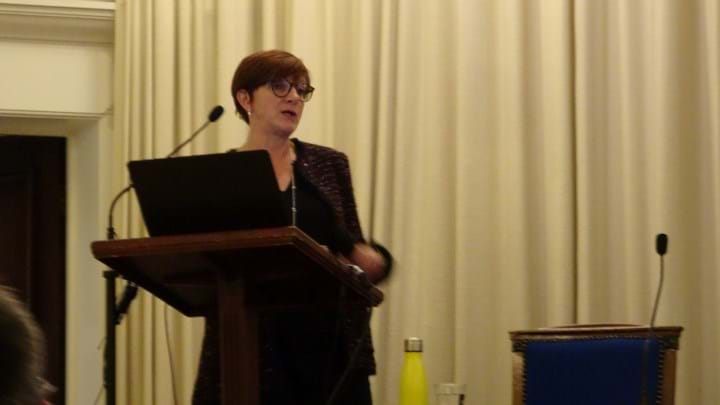Future of clean energy discussed at London workshop

THE Fuel and Energy Research Forum held its Workshop on Combustion-related Research and the Inaugural Clean Energy Science Lecture on 7 October in London, UK, in collaboration with IChemE’s Clean Energy SIG and other partners.
The event was opened by Allan Jones, Special Professor at the University of Nottingham, who spoke of the forum’s origins in the 1980s as the Coal Research Forum and how that focus has changed over the years. He said that the community has had to move on but can use the skills developed to help transition towards a sustainable energy future. He also explained how the former Coal Science Lecture became the Energy Science Lecture in recent years, with 2019 seeing the first Clean Energy Science Lecture.
The workshop consisted of presentations by PhD students from the Biomass and Fossil Fuel Research Alliance (BF2RA), as well as students from the EPSRC Centre for Doctoral Training in Carbon Capture and Storage and Cleaner Fossil Energy (CCSCFE). Presentations included Toyin Sanusi from Cranfield University speaking about the corrosive characteristics of biomass and waste combustion, and Ana Weir from the University of Nottingham speaking about her research trying to find bio-alternatives to bitumen.
This was followed by Mohamed Pourkashanian, Head of the University of Sheffield Energy Institute, talking about the new Translational Energy Research Centre which will be located at the University of Sheffield. The national research hub will develop next generation technologies in CCS, bioenergy, hydrogen, renewable energy, energy storage, and smart grids. It will give global companies and startups access to pilot-scale testing facilities and will promote industrial and academic partnerships. The research centre is due to be operational in 2022.
The Inaugural Clean Energy Science Lecture was given by Nina Skorupska, Chief Executive of the Renewable Energy Association. Her lecture described the progress made through her career – from coal to clean energy – alongside changes happening in the energy sector at the time.
She spoke of how she started her career in coal research and completed a PhD in coal combustion in 1987. The main environmental concern in the 1980s was not about trying to reduce CO2 emissions, but reducing the use of coal with high sulfur content due to concerns about acid rain.
Skorupska described how the coal industry has been declining over the years, partially due to the “dash for gas” in the 1990s. During that period EU environmental limits on SOx and NOx were introduced which saw the closure of inefficient coal and oil-fired plants. In the 2000s there was increasing work into understanding biomass combustion, and in 2008 the Climate Change Act was enacted. Around this time, discussion began on introducing CCS, although no project was successfully initiated then.
The rise in renewables has been rapid over the last decade partially due to the Government introducing a feed-in tariff for small-scale renewables in 2010. However, this progress stalled in 2018 with the “bonfire of policies” when feed-in tariffs and renewable energy schemes were removed.
Talking about meeting renewable energy targets, she said we are doing well on decarbonising power. “A third of the renewable power is coming from biomass and waste-to-energy, not just wind and solar,” said Skorupska. “It is a full bag of solutions that we need in order to deliver in this important area.”
However, the use of renewables in heating and transport is currently nowhere near sufficient. She highlighted that renewable transport fuel only makes up 5% of fuel, but this could easily be 10% if new regulations were introduced. “All the emphasis on helping reduce [emissions from] power has suddenly revealed that transport is now the worst culprit; not just land but also aviation and marine,” said Skorupska.
She said that the future will still require processing fuels, but that the fuels will be predominantly of a bio origin. “We’ve done the easy stuff already; the heavy lifting is yet to come.”
Recent Editions
Catch up on the latest news, views and jobs from The Chemical Engineer. Below are the four latest issues. View a wider selection of the archive from within the Magazine section of this site.




